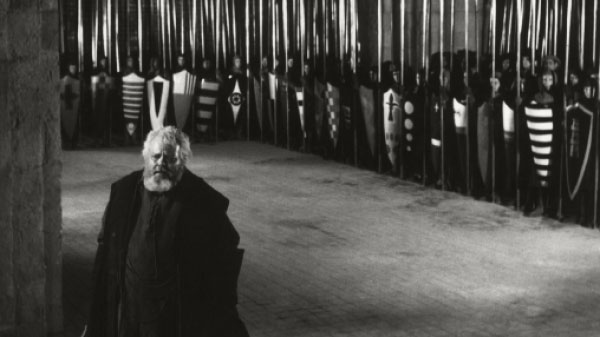
The Later Career of Orson Welles
Orson Welles’s dazzling early years are well documented and widely discussed. The son of an inventor and a concert pianist, he made a name for himself in the thirties, first onstage (with the Federal Theatre Project and the Mercury Theatre, which Welles cofounded) and then in radio. After his Halloween eve alien-invasion radio program “The War of the Worlds” convinced thousands of listeners that they were under attack, he became instantly notorious. Soon he had a Hollywood contract with RKO, where he made Citizen Kane (1941), which many critics and filmmakers around the world still call the greatest film ever made. Following this, Welles experienced a series of disappointments: his 1942 The Magnificent Ambersons was taken away in postproduction, reedited, and given a new, unauthorized ending; he was unable to finish his documentary about Rio de Janeiro’s Carnival, It’s All True; and Columbia studios head Harry Cohn meddled with the production of his 1947 noir The Lady from Shanghai, starring Welles’s then wife, Rita Hayworth.
Increasingly disillusioned by Hollywood, Welles moved on to more independently financed features in the late forties and fifties. Much discussion of Welles still focuses on his early years, while the brilliant second half of his movie career remains sorely overlooked. This period began in earnest with two Shakespeare passion projects: Macbeth (1948) and Othello (1952). Macbeth was produced for the B-movie outfit Republic Pictures, but despite the freedom Welles felt in making the film on a small budget, the studio disliked his final version, forcing him to redub much of the dialogue (which was in thick Scottish brogues) and cut it down from 107 to 86 minutes. Othello, exquisitely rendered yet plagued by a scattered shooting schedule, was filmed all over Europe, where Welles felt he was more appreciated.
Welles was embattled again on his next film, Mr. Arkadin (1955), known in Europe as Confidential Report. Shot over the course of eight months across Europe, Mr. Arkadin was a logistically ambitious work about an international man of mystery, edited and reedited by so many producers and interested parties that there exist at least seven different versions. Touch of Evil (1958), a down-and-dirty noir set on the U.S.-Mexico border in which Welles plays a corrupt American detective at odds with a Mexican policeman (Charlton Heston) during a murder investigation, marked a brief return to Hollywood for Welles, who was brought on at the recommendation of Heston. The studio, Universal, made fifteen minutes of cuts to the film, not liking its jagged pacing and visually daring touches, such as its justly famous opening long take, which has since been restored to its masterful original vision. The film would be Welles’s final studio effort.
Welles completed three feature films in the sixties, all of them literary adaptations: The Trial (1962), from the Kafka novel; Chimes at Midnight (1966); and The Immortal Story (1968), from an Isak Dinesen short story, made for French television and starring Jeanne Moreau. At this point, Welles was working exclusively in Europe, feeling he was a sort of artist in exile, treated in America as though he had never made good on his early promise. His final completed features were F for Fake (1975), a free-form faux documentary about forgers and magicians, and Filming “Othello” (1978), a nonfiction work for West German television about the complicated production of his 1952 Shakespeare film. Welles died from a heart attack in 1985, leaving many partly filmed movies on his résumé, including the Rio de Janeiro documentary It’s All True; an adaptation of Don Quixote; the thriller The Deep, starring Moreau and Laurence Harvey; and The Other Side of the Wind, which was to star John Huston as a director modeled after Welles. His career was as defined by his many unrealized projects as by his finished ones—fitting for a filmmaker whose ambitions matched his outsize talents.
Filmography
1941 Citizen Kane
1942 The Magnificent Ambersons
1943 Journey into Fear (uncredited)
1946 The Stranger
1947 The Lady from Shanghai
1948 Macbeth
1952 Othello
1955 Mr. Arkadin (a.k.a., Confidential Report)
1958 Touch of Evil
1962 The Trial
1966 Chimes at Midnight
1968 The Immortal Story
1975 F for Fake
1978 Filming “Othello”
